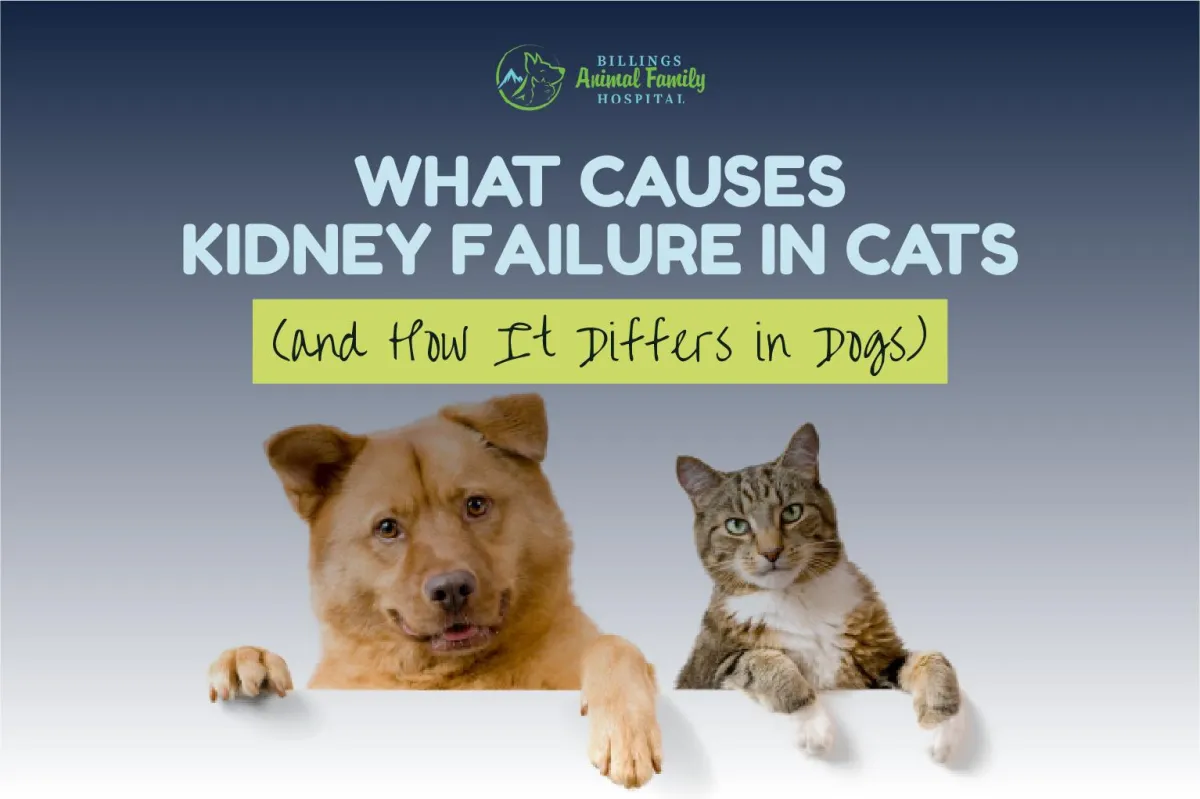
What Causes Kidney Failure in Cats & Dogs | Billings Animal Family Hospital
What Causes Kidney Failure in Cats (and How It Differs in Dogs)
Kidney failure is one of the more serious health conditions affecting our beloved pets. Understanding what causes kidney failure in cats, along with its manifestations in dogs, is crucial for early intervention, long-term management, and ensuring your furry friend receives the best quality of life.
In this guide, we break down the causes, stages, symptoms, and treatment of kidney disease in pets, providing a gentle and straightforward approach to help you feel informed and confident.
What You'll Find In This Post . . .
Common causes of kidney disease in cats
Understanding kidney function in pets
What happens when the kidneys fail?
Acute kidney failure in dogs and cats
Clinical signs of acute kidney injury
Chronic kidney disease in cats and dogs
Signs of chronic kidney disease
What makes chronic kidney disease different?
Signs of kidney disease in dogs
Treating and managing kidney disease in pets
Preventing kidney problems in cats and dogs
Supporting pets with kidney disease
What causes kidney failure in cats?
If you've ever asked yourself, "what causes kidney failure in cats?" — you're not alone. Kidney failure can be either sudden (acute kidney failure) or develop gradually over time (chronic kidney disease, or CKD).
Common causes of kidney disease in cats
Aging: Especially in older cats, kidney tissue gradually breaks down.
Toxins: Ingesting antifreeze, lilies, or human medications.
Infections: Bacterial or viral infections that damage kidney tissue.
Genetics: Some breeds are prone to polycystic kidney disease.
Other Conditions: Dental disease, high blood pressure, and heart disease can lead to kidney damage.
Often, it’s not just one factor. Many cats experience kidney decline due to a combination of age, environmental factors, and underlying health conditions.

Understanding kidney function in pets
The kidneys are multitasking organs. They filter waste from the blood, balance fluids and electrolytes, regulate blood pressure, produce red blood cells, and activate vitamin D. At Billings Animal Family Hospital, we offer comprehensive veterinary services to assess and support kidney function at every stage of your pet’s life.
What happens when the kidneys fail?
When kidney function declines, waste accumulates in the bloodstream. This leads to a condition called uremia, which can cause vomiting, mouth ulcers, bad breath, and changes in behavior. Pets may also experience dehydration and lethargy.
Maintaining healthy kidney function is essential, not just for cats but also for dogs. The sooner a problem is detected, the more we can do to support recovery.

Acute kidney failure in dogs and cats
Acute kidney failure happens quickly, often in response to toxin ingestion, dehydration, or infection. It can also occur after certain medications or surgery involving anesthesia.
Clinical signs of acute kidney injury
Vomiting or diarrhea.
Sudden lethargy.
Decreased appetite.
Little or no urine output.
Swollen abdomen or back pain.
This condition requires emergency veterinary treatment, as well as blood and urine testing, to confirm the diagnosis. In some cases, hospitalization and IV fluid therapy are necessary.

Chronic kidney disease in cats and dogs
Chronic kidney disease is more common in older cats, typically developing over several months or years. It often goes unnoticed until later stages.
Signs of chronic kidney disease
Increased thirst and urination
Weight loss
Poor coat condition
Bad breath (uremic odor)
Muscle wasting
What makes chronic kidney disease different?
Unlike acute kidney problems, chronic disease is not reversible. However, symptoms can be managed, and progression can be slowed with proper care.
Cats with chronic kidney disease may be diagnosed during routine blood work or after signs of the disease appear. While there is no cure, early management can significantly improve your pet's quality of life.
Curious about more information? You can explore Cornell University’s CKD guide for additional insight.
Kidney failure in cats stages
Kidney failure in cats stages is categorized from mild to severe:
Stage 1: No symptoms; diagnosis based on blood and urine abnormalities
Stage 2: Mild weight loss, increased thirst
Stage 3: More apparent symptoms; elevated waste levels in blood
Stage 4: Severe symptoms, decreased quality of life
Understanding the stages of kidney failure helps vets determine treatment plans and prognosis.
Kidney failure in dogs stages
Similar to cats, kidney failure in dogs also follows a four-stage process. However, symptoms in dogs may be more variable.
Stage 1: No visible symptoms, but early kidney strain begins.
Stage 2: Mild vomiting, appetite loss, and pale gums appear.
Stage 3: Frequent vomiting, fatigue, and visible weight loss.
Stage 4: Severe symptoms, confusion, no appetite, high blood pressure.
Dogs in later stages may also develop high blood pressure or become disoriented. Monitoring and veterinary supervision are critical.
Understanding these stages can help you and your vet create a care plan to manage your pet’s chronic kidney disease and preserve kidney function.

Treating and managing kidney disease in pets
While kidney failure isn’t curable, it is manageable. Treatment may include:
Special kidney-support diets with reduced protein and phosphorus
Fluids (subcutaneous or IV) to help with dehydration
Medications for blood pressure, nausea, and phosphorus control
Supplements like potassium or omega-3 fatty acids
Regular monitoring of red blood cell count and waste levels
A vet can guide you through the options to maximize your pet’s quality of life. For trusted care and support, visit Billings Animal Family Hospital to learn more about our commitment to pet health.
Preventing kidney problems in cats and dogs
While not all kidney issues are preventable, there are proactive steps you can take:
Keep pets well-hydrated
Feed a high-quality diet appropriate for their age
Schedule routine veterinary checkups
Monitor for changes in urine output or thirst
Avoid toxic plants and substances
Manage dental health to prevent bacteria from entering the bloodstream
An early diagnosis makes a significant difference, especially in cats that often hide symptoms.

Supporting pets with kidney disease
If you’re concerned about kidney failure in cats or dogs, early intervention is crucial. Understanding what causes kidney failure in cats can help you catch warning signs early and improve your pet's outcome.
Book a consultation with our team today to discuss your pet’s kidney health, testing options, or to talk through your concerns. Don't forget to download your Emergency Vet Contact Card to stay prepared for any unexpected situations. To learn more, please visit our About Page, where you can discover who we are and what we do in detail.



